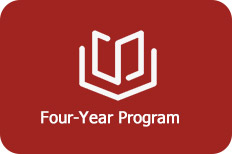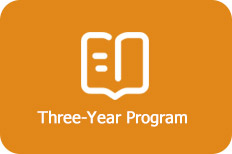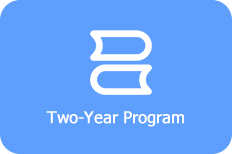
GHCIS offers the UK International General Certificate of Secondary Education (IGCSE) and Advanced Level (A Level) programs. The IGCSE program covers various subject areas to provide students with a wide range of course options. This allows students to explore their talents and personal interests while laying a solid foundation for the more advanced A Level courses. In the A Level curriculum, students select subjects based on their professional interests for deeper study. They are expected to complete four to five AS-Level subjects and three to four A-Level subjects to obtain the General Certificate of Education (GCE qualification) through qualifying exams. The school also offer AP courses such as AP Calculus BC.
Depending on the student's grade level and background, GHCIS offers different lengths of schooling: four-year, three-year, and two-year programs.

Students in the four-year program first complete two years of IGCSE courses (G1 and G2) and then move on to A Level courses. By the end of G2, students will have completed CIE AS Level Mathematics and other IGCSE subject exams. In total, they should have taken 7-9 IGCSE subject exams.
| Compulsory | English, Mathematics, Physics, Chemistry, Economics |
|---|---|
| Electives (choose 2-3) |
History, Geography, Psychology, Art & Design, Biology, Drama, Accounting, Computer Science, Business, etc. |
| Others | Chinese Language & Culture, Music, Physical Education, University Counselling Seminars, etc. |
In the event of any discrepancies regarding elective courses, the course selection instructions published annually by the admissions office shall prevail.
After completing the IGCSE exams, students enter two years of A Level study.

The three-year program is for students who have graduated from junior high school in China. These students will start with a preparatory Pre-A Level year to study IGCSE subjects and some A Level subjects. This year aims to enhance students’ English skills and lay a foundation for relevant A Level courses.
| Compulsory | English, Mathematics |
|---|---|
| Electives (choose 4) |
Physics, Chemistry, Economics, History, Geography, Psychology, Art & Design, Biology, Drama, Accounting,Computer Science, Business, etc |
| Others | Chinese Language & Culture, Music, Physical Education, University Counselling Seminars, etc. |
In the event of any discrepancies regarding elective courses, the course selection instructions published annually by the admissions office shall prevail.
Pre-year students will take CIE AS Level Mathematics and O Level English exams at the end of their first year. All other subjects will be assessed and graded internally by the school.
After passing the internal assessments, students will enter two years of A Level study.

Students who have completed their first or second year of high school in China or have completed the IGCSE examination at other A Level schools can start the two-year A Level courses directly (AS and A2 years). In these two years, students complete the AS Level exams in the first year and the A2 Level exams in the second year (AS and A2 combined as a full A Level grade). Our students usually take exams in May or June, with results announced in early August.
Upon entering the two-year A Level course, students from the four-year and three-year programs can also freely choose the following courses.
| Compulsory | English |
|---|---|
| Electives (Choose 3-4) |
Mathematics, Physics, Chemistry, Economics,History, Geography, Psychology, Art &Design, Biology, Computer Science, Drama, Business, Sociology, etc. |
| Others | Physical Education, University Counselling Seminars, etc. |
| Compulsory | \ |
|---|---|
| Electives (Choose 3-4) |
English, Further Mathematics, Physics, Chemistry, Economics, History, Geography, Psychology, Art and Design, Biology, Computer Science, Drama, Business, Sociology, etc. |
| Others | Physical Education, University Counselling Seminars, etc. |
In the event of any discrepancies regarding elective courses, the course selection instructions published annually by the admissions office shall prevail.